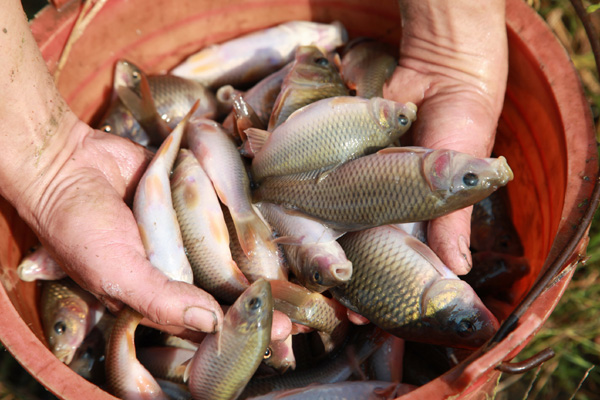China, US seek ways to benefit from carp
By Wang Qian (China Daily) Updated: 2014-09-23 07:58
|
Asian carp caught in Longshui, a village in the Guangxi Zhuang autonomous region, are shown in October. Wang Zichuang / For China Daily |
In China, Asian carp is considered a delicious dish, but in the United States, it is seen as a dangerous invasive species that threatens rivers, lakes and indigenous species.
In early September, US scientists came to China to explore ways to prevent the fish's spread in their country and explore the possibility of exporting the invaders back to China.
"Chinese love eating the fish, and the US has too many of them, which makes exploring a business plan a win-win solution," said Yang Bo, a freshwater expert from The Nature Conservancy who accompanied the US scientists during their visit. Yang made her remarks in an interview with China Daily on Monday.
But implementing such a plan won't be easy, Yang added.
Barriers to the plan include the high costs of transportation, the tariffs and the Asian Carp Prevention and Control Act, a US law that makes transportation of the live fish across US state lines illegal.
"Although difficulties exist, we are looking for high-level discussion between the two countries," she said.
One of the scientists, Jim Garvey, director of the Fisheries and Aquaculture Center at Southern Illinois University Carbondale said he hopes that research and collaboration between the US and China will lead to greater demand for the fish and enhanced economic opportunity.
Yang said that in addition to the fish products trade, China and the US will strengthen cooperation in Asian carp research, including the water temperature and flow related to breeding, so that the US can control fish reproduction and China can boost its own.
China has made various efforts for years to protect the fish.
Asian carp were first introduced into the US from China in the 1970s to help enhance water quality in ponds. Within the past four decades, the fish escaped into major waterways, including the Illinois and Mississippi rivers.
Although it lives on plankton and algae, Asian carp are a strong competitor of native fish species because of the invasive species' large size and rapid rate of reproduction.
Garvey expressed concern that Asian carp will eat freshwater mussels into extinction. The US has the greatest diversity of freshwater mussels in the world.
The US government has spent hundreds of millions of dollars to prevent the spread of Asian carp, including electric barriers, water guns and scent-based lures to try to catch them.
Garvey said the US government has spent nearly $100 million on research in the past four years to determine ways to impede movement and reduce carp density in rivers.
wangqian@chinadaily.com.cn
- Govt encourages people to work 4.5 days a week
- Action to be taken as HIV cases among students rise
- Debate grows over reproductive rights
- Country's first bishop ordained in 3 years
- China builds Tibetan Buddhism academy in Chengdu
- Authorities require reporting of HIV infections at schools
- Typhoon Soudelor kills 14 in East China
- Police crack down on overseas gambling site
- Debate over death penalty for child traffickers goes on
- Beijing to tighten mail security for war anniversary








